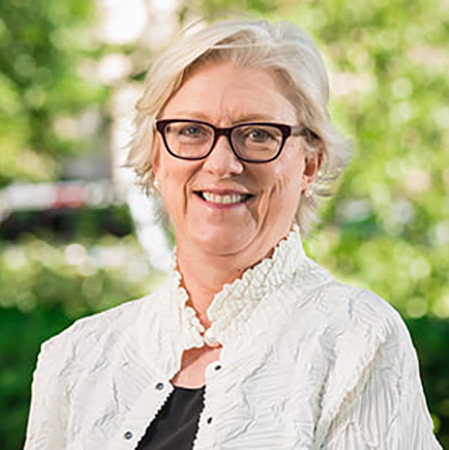P. Lindsay Chase-Lansdale
- Professor Emeritus
- Vice Provost for Academics
- Co-Associate Provost for Faculty
- Faculty Fellow, Institute for Policy Research

Lindsay Chase-Lansdale is the Frances Willard Professor Emerita of Human Development and Social Policy at the School of Education and Social Policy as well as a Faculty Fellow Emerita at the Institute for Policy Research (IPR) at Northwestern University.
She is an expert on the interface between research and social policy for children and families, and she is the first developmental psychologist to be tenured in a public policy school in the United States. She was a Congressional Science Fellow of the American Association for the Advancement of Science (AAAS)/Society for Research in Child Development (SRCD). She also was the founding director for seven years of Cells to Society (C2S): The Center on Social Disparities and Health at IPR.
From 2013-2020, Chase-Lansdale was associate provost for faculty and then vice provost for academics at Northwestern. In 2020, the Provost established the P. Lindsay Chase-Lansdale Undergraduate Summer Research Grant in Social Policy for Children and Families, awarded annually to a student in honor of Chase-Lansdale’s service to the university.
Chase-Lansdale specializes in multidisciplinary research on social issues and how they affect families and the development of children, youth, and parents. Much of her work addresses family and program strengths that lead to positive social and educational outcomes for families facing economic hardship. Specific topics include two-generation education interventions for parents and children, early childhood education, college promise programs, workforce training, family well-being, parent-child relationships, mothers’ employment, and immigration.
Chase-Lansdale co-directs the Northwestern Two-Generation Research Initiative (NU2Gen). This research program addresses the influence of two-generation education interventions on the psychological health, educational attainment, economic well-being, and healthy functioning of families, children, youth, and adults.
Chase-Lansdale is an elected member of the National Academy of Education and a fellow in the American Psychological Association and the Association for Psychological Science. She is the recipient of the Society for Research on Adolescence (SRA) Social Policy Award as well as the Society for Research in Child Development (SRCD) Award for Distinguished Contributions to Public Policy for Children. In addition, Chase-Lansdale was awarded a grant from the Foundation for Child Development to mentor scholars of color at all levels.
Chase-Lansdale has recently completed her 6-year term as an elected member of the Harvard University Board, also serving as vice chair. She is a member of the inaugural cohort (2012) of the Aspen Institute’s Ascend Leadership Fellowship, designed to bring innovative leaders together to promote a two-generation approach in policy, practice, and research. She served on the board of the Foundation for Child Development for over 25 years, and she chaired the panel from 2002-2011. She also served on the National Advisory Committee of the Robert Wood Johnson Foundation Health & Society Scholars Program and chaired the Visiting Committee of the Harvard Graduate School of Education and the NIH Study Section on Social Sciences and Population Studies.
Chase-Lansdale received her bachelor’s from Harvard University in 1974, her PhD in Developmental Psychology from the University of Michigan in 1981, and she completed the Advanced Management Program at Northwestern University’s Kellogg School of Management in 2016.
Levy, D. J., Heissel, J., Richeson, J.A. & Adam, E. K. (Working Paper/In Press/Under Review). Psychological and Biological Responses to Race-Based Social Stress as Pathways to Disparities in Educational Outcomes. American Psychologist.
Heissel, J., P. Sharkey, G. Torrats-Espinosa, K. Grant, and E. Adam. (2018). Violence and vigilance: The acute effects of community violent crime on sleep and cortisol. Child Development . Child Development: 89(4): e323-e331.
Gilbert, K., Mineka, S., Zinbarg, R. E., Craske, M. G., Adam, E. K. (2017). Emotion Regulation Regulates More Than Emotion: Associations of Momentary Emotion Regulation With Diurnal Cortisol in Current and Past Depression and Anxiety. Clinical Psychological Science: 37-51.
Tavernier, R., Adam, E. K. (2017). Text message intervention improves objective sleep hours among adolescents: the moderating role of race-ethnicity. Sleep Health 3: 62-67.
Adam, E. K., Quinn, M. E., Tavernier. R., McQuillan, M. T., Dahlke, K. A., Gilbert, K. E. (2017). Diurnal cortisol slopes and mental and physical health outcomes: A systematic review and meta-analysis. Psychoneuroendocrinology: 25-41.
Miller, G. E., Culhane, J., Grobman, W., Simhan, H., Williamson, D. E., Adam, E. K., Buss, C., Entringer, S., Kim, K., Garcia-Espana, J. F., Keenan-Delvin, L., McDade, T. W., Wadhwa, P. D., Borders, A. (2017). Mothers’ childhood hardship forecasts adverse pregnancy outcomes: Role of inflammatory, lifestyle, and psychosocial pathways.Brain, Behavior, and Immunity: 11-19.
Heissel, J., D. Levy, and E. Adam (2017). Stress, sleep, and performance on standardized tests: Understudied pathways to the achievement gap. . AERA Open: 3(3): 1–17..
Adam, E., M. Quinn, R. Tavernier, M. McQuillan, K. Dahlke, and K. Gilber (2017). Diurnal cortisol slopes and mental and physical health outcomes: A systematic review and meta-analysis. Psychoneuroendocrinology: 83:25–41.
Tavernier, R., Choo, S. B., Grant, K., & Adam, E. K. (2016). Daily affective experiences predict objective sleep outcomes among adolescents. Journal of Sleep Research, 25: 62-69.
Stalder, T., Kirschbaum, C., Kudielka, B. M., Adam, E. K., Pruessner, J. C., Wust, S., Dockray, S., Smyth, N., Evans, P., Hellhammer, D. H., Miller, R., Wetherell, M. A., Lupien, S. J., Clow, A. (2016). Assessment of the cortisol awakening response: Expert consensus guidelines. Psychoneuroendocrinology, 63: 414-432.